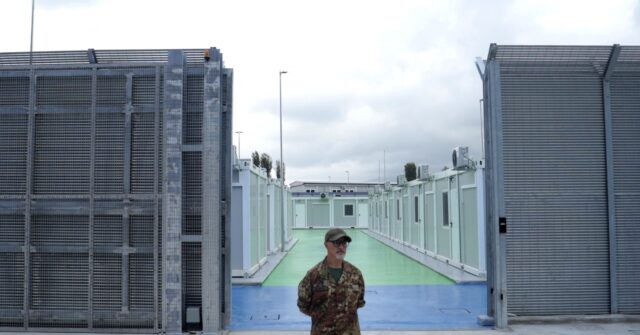Giorgia Meloni’s conservative government in Italy has initiated a significant action against illegal migration by sending migrants to offshore processing centers in Albania. The first operation commenced with the naval ship Libra transporting 16 migrants, consisting of ten Egyptians and six Bangladeshis, from the island of Lampedusa to the town of Shengjin in northwestern Albania. This move represents a fulfillment of a long-anticipated plan by the Meloni administration, which has been in negotiation with Albanian authorities for a cooperative framework to manage the inflow of migrants more effectively. As a solution aimed at managing clandestine arrivals and bolstering internal security, this measure is touted as a replicable and efficient model for handling the challenges posed by unauthorized migration.
The arrangement reached between Italy and Albania includes a substantial €670 million ($730m/£560m) investment over five years, which will permit Italy to relocate irregular migrants to these detention centers while their asylum claims are processed. While the centers will be physically located in Albania, Italy retains the responsibility for maintaining security as the properties remain under Italian jurisdiction. Migrants will initially be held in these centers for up to four weeks. After this period, those whose asylum claims are deemed valid will be transferred to Italy, while those found to have unfounded claims will face deportation back to their home countries. This plan seeks not only to expedite the processing of migrants but also to deter future attempts at illegal entry into Italy, even if it is recognized that complete removal of all illegal migrants may not be achievable.
Despite initial criticisms regarding the Meloni government’s commitment to its promise of a stringent immigration policy, including talks of a naval blockade in the Mediterranean, there are indications that its strategies might be gaining traction. Alongside the Albanian initiative, the government has engaged in agreements with African nations and imposed restrictions on non-governmental organizations operating rescue missions in the Mediterranean. Recent data from Italy’s Interior Ministry suggests that these efforts are having a positive effect, with a reported 61% decrease in illegal migration compared to the previous year. The success of the Albanian processing model could potentially position Italy as a leader in European migration management, particularly at a time when similar proposals are being scrutinized at the EU level.
The Albanian approach could also have significant political repercussions, especially for the British Labour Party government which recently abandoned a comparable plan involving Rwanda. By demonstrating the efficacy of such a model in a European context, Italy could unintentionally put pressure on the UK to reconsider its own immigration strategies. Moreover, the concurrent discussions in Brussels surrounding this model as a viable EU strategy suggests that the Albanian initiative has the potential to garner wider interest among member states grappling with similar challenges related to illegal migration.
Nevertheless, the implementation of the offshore processing plan has not gone without controversy. Human rights organizations, including Amnesty International, have expressed serious concerns regarding potential violations of human rights tied to the measures established in this agreement. The organization raises alarms about issues such as generalized detention and the implications for search and rescue operations in the Mediterranean, positing that such actions could represent breaches of Italy’s international obligations. These criticisms highlight the tensions between managing border security and upholding humanitarian and legal standards, reflecting the broader debates surrounding immigration policies across Europe.
The evolving situation in Italy under Meloni’s administration serves as a microcosm of the ongoing struggle within Europe to address the complexities of migration. As governments grapple with the pressures of public opinion and calls for stricter immigration controls, the balance between enforcing laws and adhering to human rights principles remains a critical point of contention. The effectiveness of the Albanian processing centers in curbing illegal immigration and the broader implications for European migration policy will continue to unfold, shaping the discourse around immigration for years to come. Through strategic partnerships and innovative solutions, Italy’s approach under Meloni could lead the way for reforms in how European nations tackle these pressing issues in an increasingly interconnected world.

